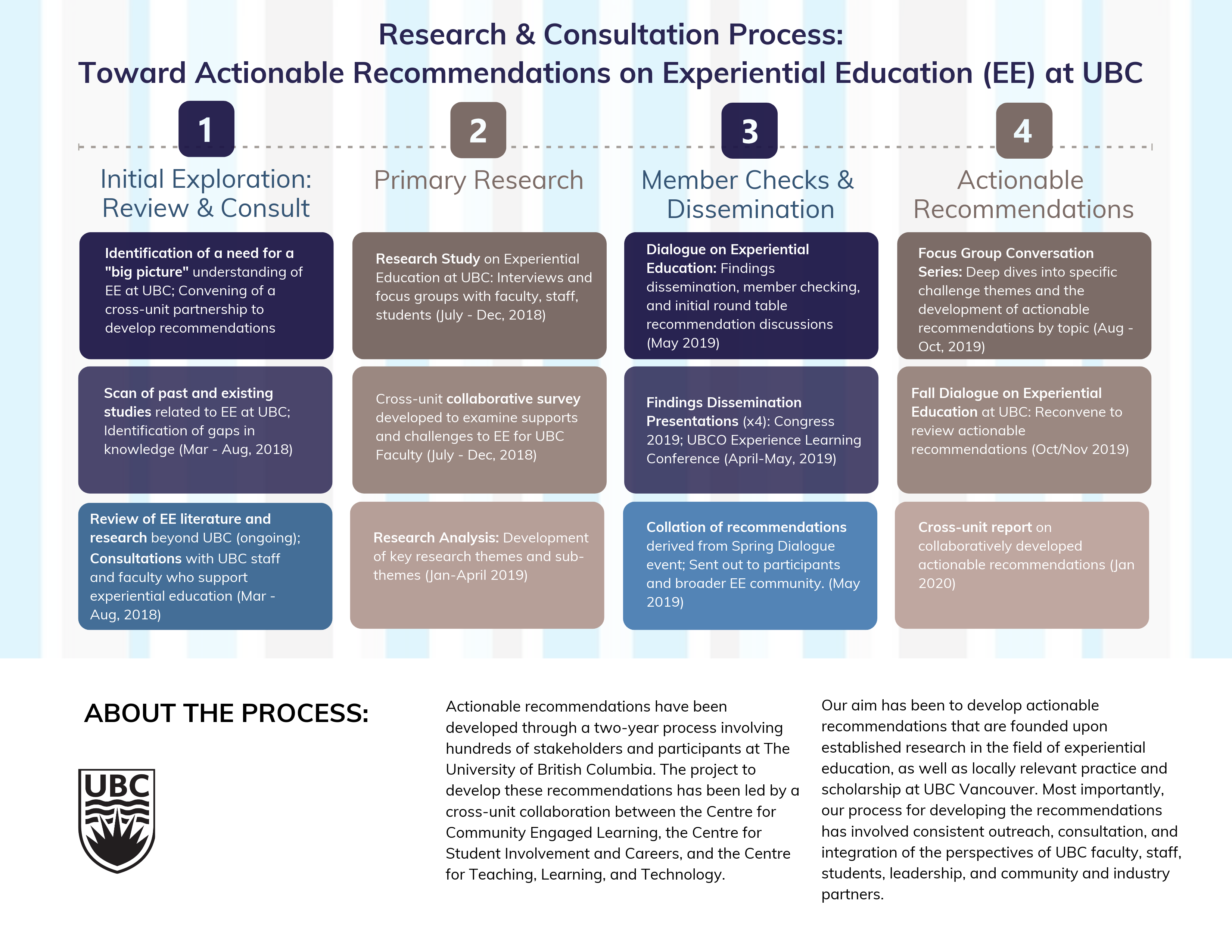Good Morning, friends and colleagues in the UBC experiential education community. Happy September!
Experiential education is often framed as “learning by doing” – an oversimplification which, by all accounts, does a disservice to the labour and thoughtfulness that often give it life. As we wrap up summer and transition into a phase of institutional activity and ‘productivity,’ this New York Times article got me thinking about the importance of summer, which, for some lucky people, involves a period of the NOT-doing. In the article titled “You are doing something important when you are not doing anything,” author, Bonnie Tsui, argues that this “fallow time” is invisible labour that allows us to generate ideas and reach what Harvard psychologist Shelley Carson calls the “absorb state.” This excerpt gets at the heart of Tsui’s argument:
I’m not talking about boredom, though that is part of the broader picture of maintaining creativity. I’m talking about an active refueling that can seem at odds with our fetishization of productivity. Reading a book, visiting a museum, wandering out to people-watch at the park. Though we purport to value artists and romanticize their muses, the aforementioned activities aren’t often recognized as work. (Tsui, 2019)
In the context of our work, this not-doing (or the not-doing-of-typical-productivity) can be a pivotal component of experiential education – a transformative means of learning through reflection and rest, and giving ourselves time to ponder connections between ideas and realities, or between what we’ve done and what we hope to do. (Sidebar: This restful reflection on what we’ve done is part of the reason that experiential education is so hard to evaluate in the short term. Anecdotally, most people I talk to about their transformative experiential education memories, convey that they didn’t realize how important or transformative it was until years later). This “fallow time”, a privilege to be sure, can be invigorating whether you’re staff, faculty, student, or community/workplace partner. Nonetheless, these “quietly dormant moments” can imbue the actual doing with far more creativity, meaning, and relationality than if we had never paused to reflect, read, play, and be present with ourselves and others. Perhaps this is why reflection is such an important aspect of experiential education for scholars like Kolb and Dewey. I wonder if “learning by being” is a more apt shorthand for such an endeavour.
This is, by now, a long-winded way of saying that I hope that this past summer you have had at least a taste of rest, reflection, and reconnection – of learning by being. As we embark on the fall semester, I wanted to share a few updates on this project and showcase a few events and resources related to experiential education:
- Project Update: Attached is a visual that illustrates a broader picture of this project I have been a part of, which has eventual goal of contributing to recommendations for enhanced support of experiential education at UBC Vancouver. Having conducted a research project, member-checked the findings, and refined action themes, we are now conducting open roundtable focus group conversations. The goal of these consultative conversations is to collaboratively develop actionable recommendations that can be submitted to UBC leadership tables such as Senate Teaching and Learning Committee. Our hope is that such recommendations will honour the suggestions and innovative ideas that so many of you have shared over the course of this project, and contribute to enhanced support (and minimized barriers) for experiential education at UBC. Stay tuned for more faculty- and student-specific focus group conversations in late September, and a larger dialogue event before winter holidays.
- Funding Opportunities:
- Open Educational Resources (OER) Fund: (deadline Nov. 29/ongoing)
- Community-University Engagement Support (CUES) Fund: (deadline Oct. 19)
- Small TLEF Innovation Projects: (deadline Nov. 14)
- SoTL Seed Program: (deadline Dec. 6)
- New UBC Resources and Publications:
- Alison Taylor (Faculty of Education) and colleagues recently published a paper in the Journal of Experiential Education.
- The Centre for Community Engaged Learning has just published some excellent online Assessment and Evaluation Tools (TLEF-funded) for community engaged learning.
- News and Events:
- University of Calgary’s Taylor Institute just announced a new Director Experiential Education, Dr. Lisa Stowe.
- University of the Fraser Valley is hiring a Director of Experiential Education (closing date Sept. 20)
- A new Experiential Learning Toolkit was recently launched by Brock University, Niagara College, and Georgian College.
- Check out some of the Activating Democracy events coming up this fall at UBC.
If you’d like more regular updates on experiential education, you can also find me on Twitter @experientialubc. My role as Analyst, Experiential Learning, will be wrapping up in the new year (March 2020), so the next steps of this project will be dispersed and passed along to the capable hands of colleagues in the CCEL, CSI&C, and the CTLT (many of whom have been a pivotal part of this work before I arrived and who will continue it after I leave). If you would like to be connected with these colleagues, please let me know and I will initiate introductions.
Thank you once again for your many contributions to the enhancement of experiential education at UBC and beyond. I continue to appreciate and learn from the diverse expertise you bring to this work.
Kari
